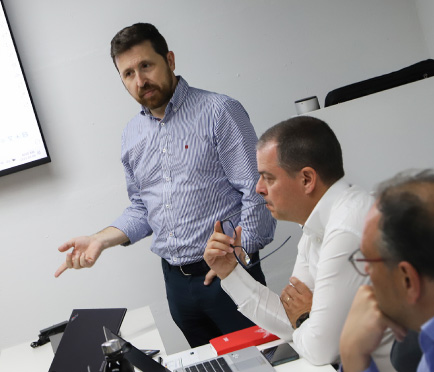From foreign terms to indecipherable acronyms, the number of products, types of software, and new concepts can discourage those less knowledgeable in the field. Among the most repeated expressions, two stand out: ERP and CRM. These are two types of software very popular among companies, but if you think they are the same, think again. Discover in the article the main differences between CRM and ERP and why you can achieve better results by integrating the two tools.
Let’s start with the acronyms, as they immediately help to understand the major difference between these two types of software. CRM stands for Customer Relationship Management and ERP, Enterprise Resource Planning. In simple terms, these tools both aim to improve management processes, but CRM focuses on managing customer information and relationships while ERP focuses on the operational management of the company, centralizing areas such as accounting, finance, human resources, and inventory.
Main Differences between CRM and ERP
Despite this difference, there are still many entrepreneurs who tend to confuse ERP and CRM. As we’ve seen, CRM is essentially centered on the customer and sales area, while ERP focuses on the company’s resources. A good CRM should prioritize tracking business opportunities (leads) and serve as a history of interactions with the (potential or not) customer.
Furthermore, CRMs are designed with the goal of closing more deals, increasing sales, and consequently, revenue. They include features such as sales management pipeline, opportunity tracking, customer management, and automation. Essentially, they are tools that enable sales teams to achieve their sales goals more efficiently.
An ERP may include some features more directed towards customer relationship, but its main focus is to help teams manage their resources and processes more efficiently. They should, therefore, be designed to help companies automate their financial resources and improve the efficiency of back-office processes, dealing with aspects such as billing, budget management, payments and receipts, forecasts, and financial reports (Business Intelligence), among others.
CRM and ERP: Integration is the Way Forward
Many experts argue that all ERPs should work integrated with a CRM. Considering that an ERP functions as an aggregator of information dispersed across different departments of a company, this logic makes sense. If not integrated with an ERP, the CRM will necessarily require the user to repeat data entry from one platform to another.
Now, imagine that to keep the information updated in both tools, you have to repeat this process several times. How much time would you lose on this task? The integration of CRM and ERP offers both B2C and B2B companies great potential to leverage their results and processes. Let’s look in more detail at 4 reasons to invest in the integration of these two systems:
1. Increase in Sales and Revenue
The integration of CRM and ERP allows companies to work more efficiently on upsell and cross-sell opportunities for their products and services. Integrated tools can present a purchase history of a particular customer and thus focus on product recommendations with a higher probability of resulting in a sale. On the other hand, the cross-referencing of information from both platforms allows identifying trends and patterns that can serve as a basis for developing segmented campaigns for that type of customer.
2. Improved Customer Service
Customer support services also benefit when the two tools work together. The team gains a 360-degree view of the customer and a global perspective of all interactions between them and the company, including previous purchases, number of orders, whether there are past complaints, among others. Having this information always accessible helps customer support representatives resolve issues more quickly, leaving customers more satisfied.
3. Greater Assertiveness in Decision-Making
Integrating the two software systems provides the user with real-time updated information and data that allow them to make safer and more accurate decisions. As we’ve seen, it also becomes easier to identify trends and track team performance indicators (KPIs). These data are essential for leveraging strategic decisions about, for example, where to allocate more resources or improve certain processes.
Imagine you own a clothing store. You can use your ERP to analyze the inventory of items, and the CRM, in turn, to review the purchase history of customers. Integrating these systems helps you obtain valuable insights, for example, about the items that are selling more quickly or which customers tend to buy items together. Based on this information, you can decide which items need stock reinforcement or even consider developing new product lines.
Access to real-time data is an extremely important tool, as it reduces or eliminates decisions made by instinct or “guesswork”.
4. Higher Levels of Collaboration
One of the greatest benefits of integrating CRM and ERP is that this combination of tools results in the creation of a single source of truth that gathers all information related to a company’s customers. It is thus possible to access all information in one place, including customer contacts, sales history, support requests, among others.
This shared access to real-time information helps everyone to be on equal footing and thus collaborate and work together to achieve the company’s goals and improve customer relationships.
Is it time to invest in a CRM for your company? ToBeFlow is a CRM software with tools for various stakeholders to feel the pulse of commercial activity and increase the efficiency of their actions. Learn more about the ToBeFlow tool and contact us to clarify any questions!





